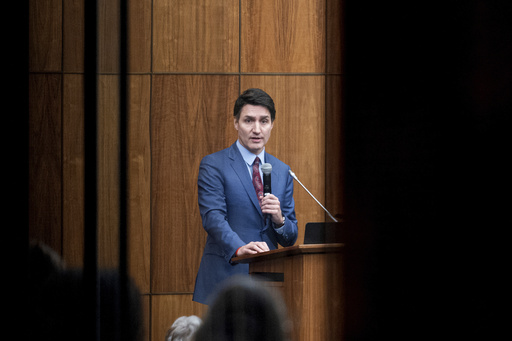
TORONTO — Prime Minister Justin Trudeau announced his resignation on Monday after a decade in office, reflecting increasing dissatisfaction with his leadership amidst significant challenges within his administration, notably marked by the sudden exit of his finance minister.
Trudeau, who has become the latest political leader to be ousted by rising voter dissatisfaction in various regions globally, expressed that he recognized he could not continue as a leader into the next elections due to internal struggles. He will remain in his position until the Liberal Party selects a new leader. “I don’t easily back down when confronted with a critical fight for our party and nation. My role is fueled by my commitment to the interests of Canadians and the health of democracy,” remarked Trudeau, visibly emotional during the announcement made outside his official residence.
The Prime Minister indicated that Parliament would be temporarily suspended, originally set to reconvene on January 27, until March 24. This hiatus is intended to facilitate the Liberal Party’s leadership election. With all major opposition parties signaling intentions to challenge the Liberal Party’s standing during a no-confidence vote when Parliament resumes, it appears likely that Canadians will find themselves heading to the polls in the spring following the appointment of a new Liberal leader.
“The Liberal Party of Canada is an essential institution in our nation’s historical and democratic fabric. I look forward to seeing a new prime minister and leader embody its values during the next electoral contest,” Trudeau said. He took office in 2015 after a decade-long Conservative reign and was initially praised for steering the nation back to its liberal roots. However, discontent among voters grew in recent years as issues concerning inflated food and housing costs and increased immigration surfaced.
In a pre-recorded message shared on X, Conservative leader Pierre Poilievre suggested that Canadians “eager to close this troubling chapter of our history might find relief” in Trudeau’s decision to step down. Nonetheless, Poilievre questioned the underlying changes by stating that all current Liberal MPs and potential leadership candidates played roles in the perceived failures over the past nine years. Other opposition leaders, including Jagmeet Singh of the New Democratic Party, echoed sentiments of disappointment, emphasizing that regardless of who leads next, the Liberal Party has failed to meet Canadians’ expectations and does not warrant another opportunity.
Sachit Mehra, president of the Liberal Party, conveyed gratitude towards Trudeau for his contributions to the nation, including initiatives like affordable child care, dental support, and national climate programs. Mehra announced intentions to convene a meeting this week aimed at initiating the selection of a new leader.
Trudeau’s resignation occurs amid complicated international dynamics for Canada, particularly in light of looming threats from U.S. President-elect Donald Trump, who warned of significant tariffs on Canadian imports if the flow of migrants and drugs is not addressed. Contrarily, statistics show that considerably fewer individuals cross into the U.S. from Canada than from Mexico, where Trump has similarly expressed his discontent.
As a significant supplier of oil and natural gas to the U.S., Canada also contributes to the American market through steel, aluminum, and automobiles. Following Trudeau’s announcement, Trump reiterated his recent comments by dismissively referring to Canada as the 51st state and inaccurately claimed on social media that Trudeau resigned due to Canada’s dependency on American subsidies.
Despite facing increasing pressure to step down in prior weeks, Trudeau remained publicly silent. Daniel Béland, a political science professor at McGill University, remarked that “his extended silence amid this political drama speaks volumes about the fragility of his current standing.”
Chrystia Freeland, Trudeau’s former finance minister, resigned from the Cabinet on December 16, critiquing some of Trudeau’s economic strategies amidst Trump’s threats. Her unexpected departure, following that of the housing minister, raised doubts about Trudeau’s viability as a leader. The two had differing views on recently proposed policies, including temporary tax holidays and direct financial assistance to citizens, which Freeland deemed unsustainable.
While Trudeau intended to seek a fourth term, no prime minister in over a century has secured four consecutive terms. Recent electoral defeats for his party in iconic districts and recent polls showing the Liberals trailing significantly behind Conservatives have further diminished his chances.
Throughout his time in office, Trudeau championed numerous progressive causes, advocating for a balanced approach to immigration while promoting diversity and gender equality through equal representation in his Cabinet. He also legalized cannabis and aimed to balance economic growth with environmental responsibility, implementing a carbon tax while attempting pipeline expansions to enhance Alberta’s oil market access.
Despite Canada boasting lower mortality rates from COVID-19, widespread financial support for citizens, and overcoming vaccine mandate controversies, Trudeau faced growing unrest that manifested into violent displays of contempt in rural regions. Over time, a combination of scandals and unpopularity paired with ineffective policy decisions eroded his standing.
Trudeau, the son of the iconic Pierre Trudeau who governed Canada for nearly 16 years beginning in 1968, was born into a political dynasty and achieved international fame upon his election. A former educator, nightclub bouncer, and snowboard instructor, he captured public interest with his charisma and was the second-youngest prime minister in Canada’s history, overcoming initial doubts regarding his age. He secured a sweeping victory in 2015, yet as challenges mounted, cracks in his administration became increasingly evident.

